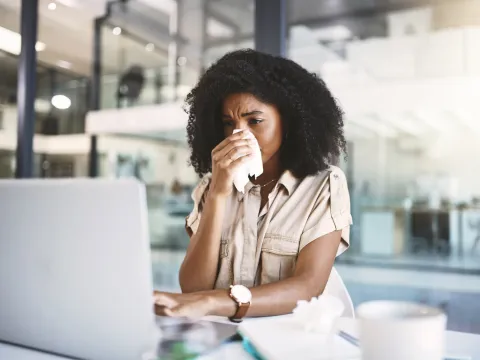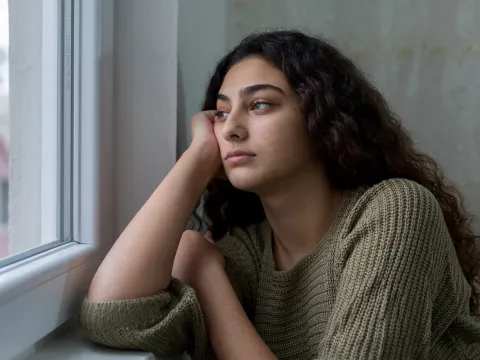- AdventHealth Hendersonville

Choose the health content that’s right for you, and get it delivered right in your inbox.
We are seeing a shift from people around the world anxiously awaiting their turn to receive the COVID-19 vaccine to others still deciding if getting vaccinated is the right choice for them. The “to vaccinate or not to vaccinate” against coronavirus debate has been the topic of many family discussions, but we’re here to help you make informed decisions — and answer difficult questions.
Here are a few concerns you or your loved ones may have about the COVID-19 vaccine and some ways you can help respond to these concerns.
If they say, “I don’t know if the vaccine is safe.”
You can say: I understand, but extensive clinical trials were conducted with many thousands of study participants to evaluate the COVID-19 vaccine. The trials generate scientific data and other information for the Food and Drug Administration (FDA) to determine its safety and effectiveness.
AdventHealth’s COVID-19 Vaccine Scientific Review Committee, as an independent committee, also reviewed the process which evaluated the efficacy and safety of the vaccine.
If they say: “The vaccine was created too quickly.”
You can say: Here are two of the main reason it was able to be developed quickly. First, it’s a worldwide medical emergency, allowing companies to apply for emergency use authorization (EUA) through the FDA.
The EUA process was designed to help communities when circumstances call for immediate action, such as during a pandemic. The vaccine manufacturers were simultaneously creating vaccines during their trials so they would immediately be ready to distribute, once granted EUA.
Second, with vaccines like Moderna and Pfizer, the mRNA technology allowed those vaccines to be developed faster because this isn’t a new technology. But it is the first time a synthetic mRNA vaccine has been widely distributed.
If they say: “I don’t know what’s in the vaccine.”
You can say: The ingredients vary for each of the vaccines from different manufacturers. Moderna and Pfizer’s vaccines each contain something called mRNA, or messenger ribonucleic acid. These vaccines work by using synthetic mRNA to direct the body to produce a small amount of spike protein.
Once the vaccinated person’s immune system detects this protein, their body begins producing protective antibodies to defend against coronavirus.
The protective antibodies will recognize and help prevent COVID-19 from getting into the body’s cells in the future, should that person be exposed to coronavirus.
If they say: “I’m not sure how the vaccine works.”
You can say: I know that the vaccine helps you develop antibodies that make you less susceptible to the disease. It does not use the live virus that causes COVID-19.
Some COVID-19 vaccines need two doses to be effective. Second dose scheduling information will be provided following your first dose, and the second dose should take place no sooner than 21 days (or 28 days, depending on manufacturer) following the first dose.
If they say: “I’m worried about the side effects.”
You can say: More often than not, any side effects from the vaccine are much milder compared to actually getting COVID-19. Like with other vaccines, it’s normal to possibly experience some fatigue, aches or fever after getting a shot. This does not mean the vaccine has given you COVID-19 — it just means your body’s immune system is working to protect itself.
If they say: “Even if I get the vaccine, I could still spread COVID-19.”
You can say: Maybe, but we just don’t know yet. While data shows high effectiveness in protection against infection, little is known on the vaccine’s effectiveness to prevent spreading from individuals who are infected and asymptomatic — despite being vaccinated.
This unknown impact is one of the reasons we need to continue to wear masks, social distance and take other precautions, even after the vaccines are available. Getting your shot can still help you stay healthier if you come in contact with the virus.
If they say: “The vaccine could give me COVID-19.”
You can say: None of the vaccine candidates currently available are considered “live vaccines,” meaning they have no live virus in them and cannot give a person the disease. COVID-19 will not be injected into your body if you get vaccinated.
If they say: “The vaccine could cause issues with pregnancy and/or infertility.”
You can say: Organizations, including the American College of Obstetricians and Gynecologists and the Society for Maternal-Fetal Medicine, note that although there are no COVID-19 vaccine studies just of pregnant women, there is no evidence that the vaccine is harmful to women trying to get pregnant, who are now pregnant, or who plan to breastfeed.
The COVID-19 vaccine has never been linked to infertility and experts say there is no reason why it should cause any problems for women who want to have children.
More Information on Coronavirus Vaccines
As more information on COVID-19 vaccine options becomes available, we’ll keep you informed. Stay in the loop by visiting the Coronavirus Vaccine Resource Hub.



